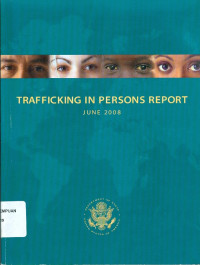
Text
Trafficking in persons report: june 2008
The goal of this report is to shine a light on recent accomplishments and encourage governments in their resolve to confront those who prey on the weakest and most vulnerable members of society. Together, we are confident that this modern, growing abolitionist movement will continue to rescue, rehabilitate, and restore the lives of those from whom so much has been taken. The Department of State is required by law to submit a Report each year to the U.S. Congress on foreign governments’ efforts to eliminate severe forms of trafficking in persons. This Report is the eighth annual TIP Report. It is intended to raise global awareness, to highlight efforts of the international community, and to encourage foreign governments to take effective actions to counter all forms of trafficking in persons.
The U.S. law that guides anti-human trafficking efforts, the Trafficking Victims Protection Act of 2000, as amended (TVPA), states that the purpose of combating human trafficking is to punish traffickers, to protect victims, and to prevent trafficking from occurring. Freeing those trapped in slave-like conditions is the ultimate goal of this Report—and of the U.S. Government’s antihuman trafficking policy.
Human trafficking is a multi-dimensional threat. It deprives people of their human rights and freedoms, it increases global health risks, and it fuels the growth of organized crime.
Human trafficking has a devastating impact on individual victims, who often suffer physical and emotional abuse, rape, threats against self and family, and even death. But the impact of human trafficking goes beyond individual victims; it undermines the health, safety, and security of all nations it touches.
There is an ever-growing community of nations making significant efforts to eliminate this atrocious crime. A country that fails to make significant efforts to bring itself into compliance with the minimum standards for the elimination of trafficking in persons, as outlined in the TVPA, receives a “Tier 3” assessment in this Report. Such an assessment could trigger the withholding by the United States of nonhumanitarian, non-trade-related foreign assistance. In assessing foreign governments’ efforts, the TIP Report highlights the “three P’s”—prosecution, protection, and prevention. But a victim-centered approach to trafficking requires us also to address the “three R’s”—rescue, rehabilitation, and reintegration— and to encourage learning and sharing of best practices in these areas. We must go beyond an initial rescue of victims and restore to them dignity and the hope of productive lives.
Availability
| KP.IV.3.00044 | KP.IV.3 INT t | My Library | Available |
Detail Information
- Series Title
-
-
- Call Number
-
KP.IV.3 INT t
- Publisher
- Amerika Serikat : US Depatement of State Publication., 2008
- Collation
-
292p. : ill. ; 29cm.
- Language
-
English
- ISBN/ISSN
-
-
- Classification
-
KP.IV.3
- Content Type
-
-
- Media Type
-
-
- Carrier Type
-
-
- Edition
-
-
- Subject(s)
- Specific Detail Info
-
-
- Statement of Responsibility
-
-
Other version/related
No other version available
File Attachment
Comments
You must be logged in to post a comment
 Computer Science, Information & General Works
Computer Science, Information & General Works  Philosophy & Psychology
Philosophy & Psychology  Religion
Religion  Social Sciences
Social Sciences  Language
Language  Pure Science
Pure Science  Applied Sciences
Applied Sciences  Art & Recreation
Art & Recreation  Literature
Literature  History & Geography
History & Geography